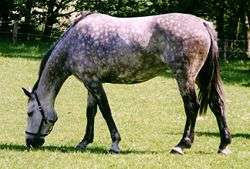Definify.com
Webster 1913 Edition
Hest
Webster 1828 Edition
Hest
HEST
,Noun.
Definition 2026
hest
hest
See also: heşt
English
Noun
hest (plural hests)
- (obsolete) Command, injunction.
- 1610, The Tempest, by Shakespeare, act 3 scene 1
- FERDINAND: [...] What is your name?
- MIRANDA. Miranda — O my father! / I have broke your hest to say so.
- 1610, The Tempest, by Shakespeare, act 3 scene 1
Related terms
Translations
command, injunction
|
Anagrams
Danish

hest
Etymology
From Old Norse hestr (“stallion”), from Proto-Germanic *hangistaz.
Pronunciation
- IPA(key): /hɛst/, [hɛsd̥]
Noun
hest c (singular definite hesten, plural indefinite heste)
Derived terms
Inflection
Inflection of hest
References
- “hest” in Den Danske Ordbog
Norwegian Bokmål

hest
Etymology 1
Adjective
hest
- neuter singular of hes
Etymology 2
From Old Norse hestr, from Proto-Germanic *hangistaz.
Noun
hest m (definite singular hesten, indefinite plural hester, definite plural hestene)
- a horse
Derived terms
References
- “hest” in The Bokmål Dictionary.
Norwegian Nynorsk
Etymology
From Old Norse hestr, from Proto-Germanic *hangistaz.
Noun
hest m (definite singular hesten, indefinite plural hestar, definite plural hestane)
- a horse
Derived terms
References
- “hest” in The Nynorsk Dictionary.
Zazaki
Etymology
From Proto-Indo-Iranian (compare Persian هشت (hašt)), from Proto-Indo-European *oḱtṓw.
Numeral
hest